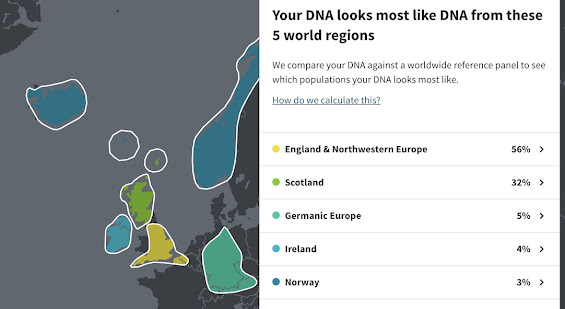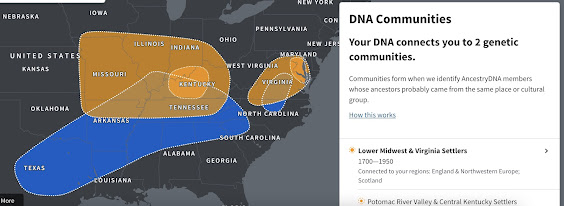Hurrah! Ancestry.com has redone the DNA tests again. The company retests stuff every few years, per better technology and more samples to judge against. And this time, I've gone down from 73% England & Northwestern Europe (a wee slice of the French and Belgium coasts) to 56% (hurrah!), and increased my Scottish ancestry - it's now up to 32%! The rest: Germanic Europe 5%, Ireland 4%, Norway 3%.
And the reality is... it doesn't really mean I'm more Scottish than I was last week. The reality is that someone whose grandparents were all Pakistani and who was born in Scotland and is living there now is far, far more Scottish than I am.
To figure out a person's regional ethnic connections, Ancestry.com - and the other companies - compare your DNA to a reference panel of DNA from groups of people who have they have designated as having "deep roots" in one region - people who have family going back for many, many generations in that specific region. They look at more than 1000 sections of a person's DNA and assign each section to the ethnicity region it looks most like. Then they turn those results into the percentages or estimates we all geek out over.
As I wrote in Ancestry drama, the blog right after my first revised DNA results, which drastically reduced my percentage of shared DNA with the Irish and Scots:
the reality is that the people I thought I was descended from in Ireland and Scotland didn't even build all the rock circles there - the people that built those were smaller, darker, and share genetic heritage with the people in Sardinia now - and, sadly, were completely wiped out by the people I thought I was related to.
So even if I were "more" Scottish, I could not gaze upon the incredible rock circles of Kilkenny and believe I had some sort of special DNA connection to the people that built them - instead, I have a special DNA connection to the people that killed all those cairn and rock circle builders.
Upon seeing the results of the first test, the idea of being associated with the people who have been in Ireland and Scotland for the last several hundred years thrilled me. The idea of being as much Greek and Roman as I was English thrilled me. But, wham, better science with the revised test, and suddenly, I was just English. I was heartbroken. I wrote on Facebook how disappointed I was to be so boring, and an English friend responded:
But what IS English? We’re a complete mixture. Aside from 2000 years of trade with Europe and beyond, mixing with the Celts, we’ve been invaded by Vikings (Scandinavian), Romans (from anywhere in the Empire from North Africa to the Balkans and Germany to Spain) and the Normans (french people of Nordic origin) so actually you’re still desperately exotic, windswept and interesting!!...
The English are mutts. Truly.
And now, here I am, with the second revised DNA results, and my Scottish ancestry has shot back up, and I'm thrilled for no good reason.
The reality is that I'm me, regardless of what my DNA test results say.
What I'm much more interested in is the names of each of my ancestors that came from across the ocean to North America. I want to know where each was from and where each landed, and I'd love to get some idea of who each was: indentured servant? Criminal? Ain't no royalty or landed gentry in this crew, I can tell you that much. But it's hard - my first foreign relative doesn't show up until a great, great, great grandfather, from Germany. I don't know his name - just his daughter's name, and on the first US Census where she's listed, she's married and says her father was German. Dead End. I've got a lot of dead ends. I come from people who were poor farmers with inconsistent spelling abilities and questionable literacy skills.
What I'm also much more interested in is trying to find out who my long-dead family is: what did they do to make ends meet? How many children did they have? Where did they live? Did they serve in wars?
And inevitably, you get to a place in your family where you have to choose between the name given and the actual biological roots - because none of us are without at least one moment in our tree where a biological father is unknown, or a biological father wasn't at all a part of someone's upbringing. None of us are without adoptions, official or unofficial, in our family trees. And I go for what I consider family: them that raised ya and claim ya. I'm much more interested in the connections of family and shared experiences than I am in DNA, ultimately.
The reality is that I'm me, regardless of what my family names say.
My previous blogs on the subject of ancestry:
Rethinking "indigenous" & DNA results
Ethnic, cultural, gender identity - good luck with your definitions


No comments:
Post a Comment